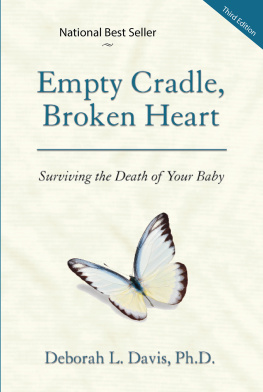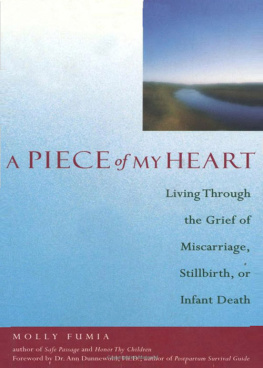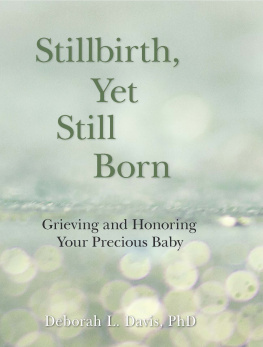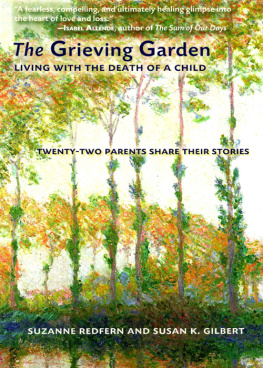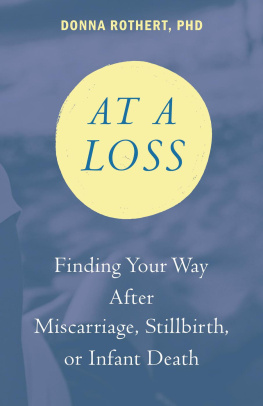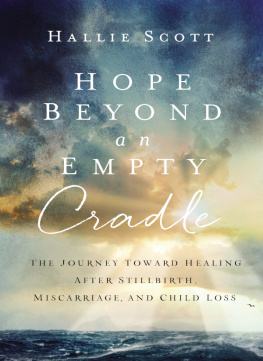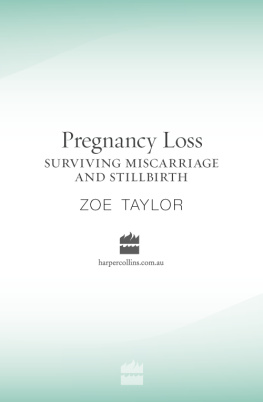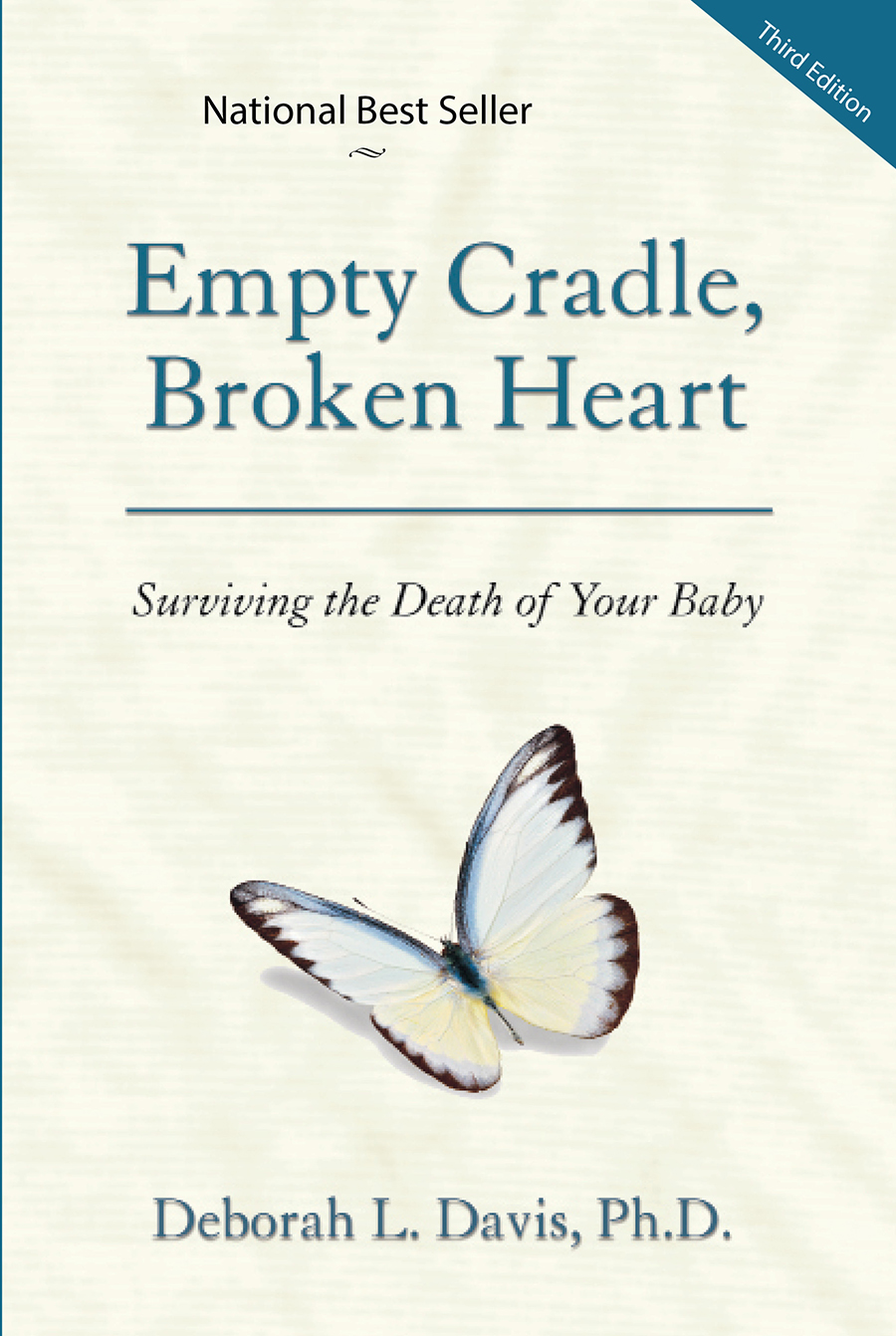Empty Cradle,
Broken Heart
Surv iving the Death
of Your Baby
Third Edition
Deborah L. Davis, Ph.D.
Dedication
To all of your babies, loved and remembered always
A Mothers Love Song
Last night, I awakened to sounds of laughter outside my window
But the nearer noise of my fast-beating heart enveloped me
With memories of soft, sweet baby cries when you were born
Before the ones in white tore you from my arms
And bore you to your first and last crib, a small white casket.
An old, old wound, a long time closed, the pain now dull,
Unhealed and bled afresh and red from my mourning heart
Absorbed by earth, your eternal bed, my second born
In unfair death, in wretched, selfish death
That cheated me of a lifetime of loving you.
Part of me, deep and secret, lies with you in a maternal embrace
Wrapped in infant arms I never touched or kissed
Near a tiny face I saw but one too brief moment
Just long enough to engrave forever in my heart a question
What would you have given this world if not your life?
Carol J. Curtis
For Tom Eric Wilcox
Born 12/7/68, Died 12/7/68
Credits
Elizabeth (Heineman) is the author of Ghostbelly (Feminist Press, 2014). She is quoted in part from (1) her 2011 essay My Stillborn Childs Life after Death at http://www.salon.com/2011/10/07/my_stillborn_childs_life_after_death/; (2) her 2012 essay Still Life with Baby at
http://newmillenniumwritings.com/showdb.8.php?w=88; and (3) an interview by Lisa Morguess at http://www.lisamorguess.com/2014/05/15/birth-death-interview-giveaway/.
Nicola (Daly) is quoted from her book Sashas Legacy: A Guide to Funerals for Babies (Steele Roberts Publishers, 2005).
Mel (Scott) is quoted in part from her memoir, After Finley , which is available through her website, www.finleysfootprints.com.
Lori (Martini) is quoted in part from her personal account, which appears on her website, www.HealingFromTheStart.com.
Nathan (Oldfield) is quoted in part from Stillbirth & Surfing: A Grief Journey , a short taken from his feature-length surf film, Seaworthy (2012, https://vimeo.com/28056957).
Ben (Welnak) is quoted in part from a post on his blog Mountain Bike Radio at http://mountainbikeradio.com/life/life/.
Copyright 2016 Deborah L. Davis
Cover Photograph: Shutterstock/
All rights reserved. No part of this book may be reproduced or transmitted in any form or by any means, electronic or mechanical, including photocopying, recording, or by any information storage and retrieval system, without permission in writing from the publisher.
Parts of chapter 9 were adapted from the authors book Loving and Letting Go: For Parents Who Decided to Turn Away from Aggressive Medical Intervention for Their Critically Ill Newborns. Omaha, Neb.: Centering Corporation, 2002.
The information contained in this book, although based on sound medical judgment, is not intended as a substitute for medical advice or attention. Please consult your doctor or health care provider for individual professional care.
Please note that URLs are subject to change. If a URL is incorrect, please contact Fulcrum Publishing via fulcrumbooks.com.
Library of Congress Cataloging-in-Publication Data
Names: Davis, Deborah L., 1955- author.
Title: Empty cradle, broken heart : surviving the death of your baby / by
Deborah L. Davis, Ph.D.
Description: Third edition. | Golden, CO : Fulcrum Publishing, [2016]
Identifiers: LCCN 2016023559 | ISBN 9781936218240 (paperback)
Subjects: LCSH: Perinatal death--Psychological aspects. |
Bereavement--Psychological aspects. | Adjustment (Psychology) | Parent and
child. | BISAC: SELF-HELP / Death, Grief, Bereavement. | FAMILY &
RELATIONSHIPS / Death, Grief, Bereavement.
Classification: LCC RG631 .D38 2016 | DDC 618.3/92--dc23
LC record available at https://lccn.loc.gov/2016023559
Printed in the United States of America
0 9 8 7 6 5 4 3 2 1
Fulcrum Publishing
4690 Table Mountain Drive, Suite 100
Golden, CO 80403
(800) 992-2908 (303) 277-1623
www.fulcrumbooks.com
Please Read This First
Since the second edition of this book was published twenty years ago, much has changed in the field of perinatal bereavement. First and foremost, there have been vast improvements in the quality of bereavement care following the death of a baby at any time during pregnancy, birth, or infancy. Quality care in most hospitals used to mean keeping parents away from their dead or dying babies, or perhaps offering them a mere glimpse or a scant hour, all in a misguided effort to spare them emotional pain. As it turns out, shielding parents can cause far more harm than good.
Change, to a large extent, has been and continues to be spurred by distressed parents speaking out about what they found or wouldve found helpful. Change is also due to the efforts of compassionate caregivers who have seen the need, become parent advocates, and pushed for policy changes from within their hospitals and clinics. This kind of inside-out change is powerful and enduring.
So nowadays, the gold standard of care is to approach parents with the knowledge that this baby is theirs and to support them in spending as many hours or days and nights as they want with their little one. Parents are also reclaiming important mourning traditions, such as taking the body home to provide after-death care until burial or cremation. Gentle, reassuring guidance is also offered, particularly for parents just meeting their babies, who have died at any time during pregnancy, labor, or shortly after birth. With compassionate support, the vast majority of parents are eager to welcome their infant, express their love and nurturing devotion, share their baby with family and friends, and engage in formal rituals as well as spontaneous, informal moments of profound sacredness.
Parents are also more comprehensively supported in collecting mementos. Instead of being left to wish for an image of their baby, or maybe cherishing the one blurry Polaroid photo taken by a caring nurse, parents nowadays often receive many high-quality digital images, some taken by professionals who volunteer their services or by caregivers who seek out training in the art of bereavement photography. These photographs are often their most treasured possessions.
Perhaps most remarkable is the enormous progress in medical ethics and end-of-life care. When the prognosis is uncertain, instead of being told what kind of medical care their critically ill baby will receive, parents are being included as collaborators and trusted decision makers. And when a baby is diagnosed in utero with a life-limiting condition, instead of being told that their only option is to terminate the pregnancy or submit their baby to a futile but required course of intensive care, more and more parents are offered the option of continuing their pregnancy and delivering their baby into hospice and palliative care. Known as perinatal hospice, this movement has spread into pockets around the globe. Perhaps within the next decade, offering and providing this option to parents will become standard care.
Across the board, there is still room for improvement. Fortunately, there is a growing recognition of the importance of training caregivers in the specialty of bereavement care and the need for hospital administrations to support this kind of carenot as optional, but as mandatory , hospital-wide. The concepts of family-centered care, patient-centered care, developmentally supportive care, and relationship-centered care are also burrowing into medical culture and form the cornerstone of quality care. And finally, at long last, more research is being done on the effects of bereavement care as well as the causes and prevention of death, particularly during pregnancy.

